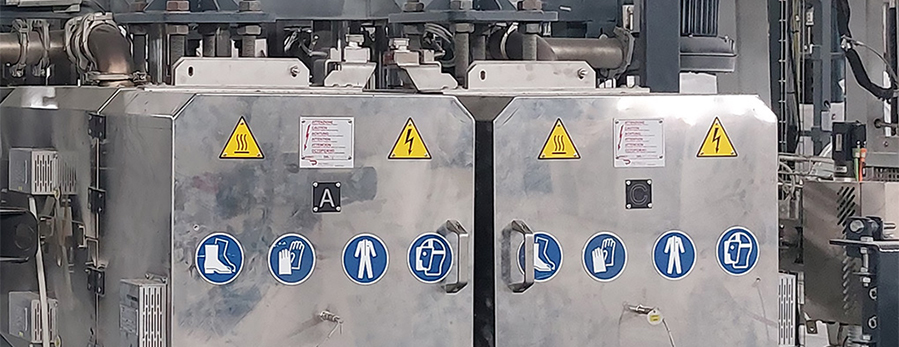#Recycling / Circular Economy
Bottle-to-fibre and bottle-to-bottle: Two Starlinger PET recycling lines for Indian recycling brand Go Rewise

Ganesha Ecopet Private Limited, a subsidiary of Indian PET recycling pioneer Ganesha Ecosphere Ltd., has recently opened its new Warangal facility under the brand name Go Rewise where it produces rPET for filament yarns and fibres, as well as for food-grade packaging.
rPET for fibre applications
The first Starlinger recycling line, a recoSTAR PET 165 H-VAC, processes washed PET bottle flakes for the Go Rewise polyester filament yarn applications and reaches an output of approx. 14,000 tons per year. When using recycled PET for filament yarn production, it must meet highest quality standards. Thus, all foreign particles and polymers have to be removed before the extrusion process. To achieve optimum melt purity for extrusion, Starlinger has developed a special candle filter for fibre applications, called Rapid Sleeve Changer (RSC). It ensures finest melt filtration down to 15 ?m and achieves a throughput of up to 2000 kg per hour. The filter elements can be changed without interrupting production, which significantly reduces melt loss and machine downtime.
Going food-grade
With the second Starlinger recycling line, Ganesha is producing food-grade rPET resins. “Through venturing into bottle-to-bottle recycling we want to close the loop and move from secondary recycling into primary recycling”, said Prashant Khandelwal, Senior Vice President of Go Revise. “Bottle-to-bottle recycling reduces the need for virgin plastic and thus substantially decreases the plastic burden on the planet. It also uses approximately 80 % less resources – water, energy, et cetera – for producing a new bottle than it is the case with virgin resin. Earlier, brand owners used to be apprehensive about including rPET in their packaging product, but with the emergence of new technologies and strict regulations by governments the demand for rPET is increasing very fast.”
The Starlinger recoSTAR PET 165 HC iV+ bottle-to-bottle recycling system installed at Ganesha’s Go Rewise facility features an SSP (solid state polycondensation) reactor for food-grade decontamination of the produced rPET pellets. A positive EFSA opinion for the process has been issued end of June 2022. The line has taken up production in July 2022 and has an output of up to 1,800 kg of recycled PET pellets per hour. The food-safe rPET is supplied to environment-conscious and quality-focused brands which use it in their brand packaging.
Khandelwal describes the special challenges the company is facing with regard to food-grade applications: “Raw material quality is highly variable, especially in India. The scrap has all kinds of impurities and every batch that enters the factory is different. It has taken us 30 years to understand and master the art of handling such waste. With the world’s best technologies, we can now achieve the quality needed for food-grade applications.”
With the new PET bottle-to-bottle recycling plant, Go Rewise ranks among the first recycled PET brands in India to provide food-grade rPET for the local and international packaging market.
According to Khandelwal, the high acceptability by brand owners was one of the reasons Ganesha opted for Starlinger technology. “Starlinger’s PET recycling technology has received several Letters of Non-Objection from the US FDA as well as positive opinions of Europe’s EFSA for food-grade applications and is already well known among brand owners. The proven Starlinger quality, equipment reliability and technology standard, as well as efficient resource consumption while delivering best quality output were additional points”, he stated.
With both new Starlinger lines operational, the rPET production capacity of Ganesha’s Go Rewise facility currently reaches 40,000 tons per year.
Ganesha Ecosphere has a remarkable history in PET recycling”, said Paul Niedl, Commercial Head of Starlinger recycling technology. “The company’s founder Shyam Sunder Sharmma recognised the big potential that used PET bottles provide as a secondary resource at a remarkably early stage, making the company a trailblazer for bottle-to-fibre and now bottle-to-bottle applications. We feel proud to support Ganesha Ecosphere in reducing plastic waste and establishing a closed loop for PET bottle waste in India, a country with great potential in this sector.”
A PET recycling pioneer
Ganesha Ecosphere looks back on 30 years of experience in the PET recycling business and can be considered a role model regarding sustainable business activities.
Founded in 1987, the company started out as a yarn processing facility. It was among the first companies in India to start reprocessing PET waste to manufacture recycled polyester staple fibre (RPSF) and recycled polyester spun yarns (RPSY) in 1994.

By today, the group has established a large network of over 300 scrap vendors located across the country and operates four factories in India – two in Uttar Pradesh, one in Uttarakhand, and the recently opened one in Telangana. It also recently operationalised its first factory outside India in Nepal.
With over 500 customers and exports to more than 18 countries, the company ranks among the largest rpet producers in India with 130,000 tonnes per year and currently recycles around 16 – 18 % of India’s total PET waste.
For more information visit:
https://ganeshaecosphere.com/ and https://gorewise.com/.












